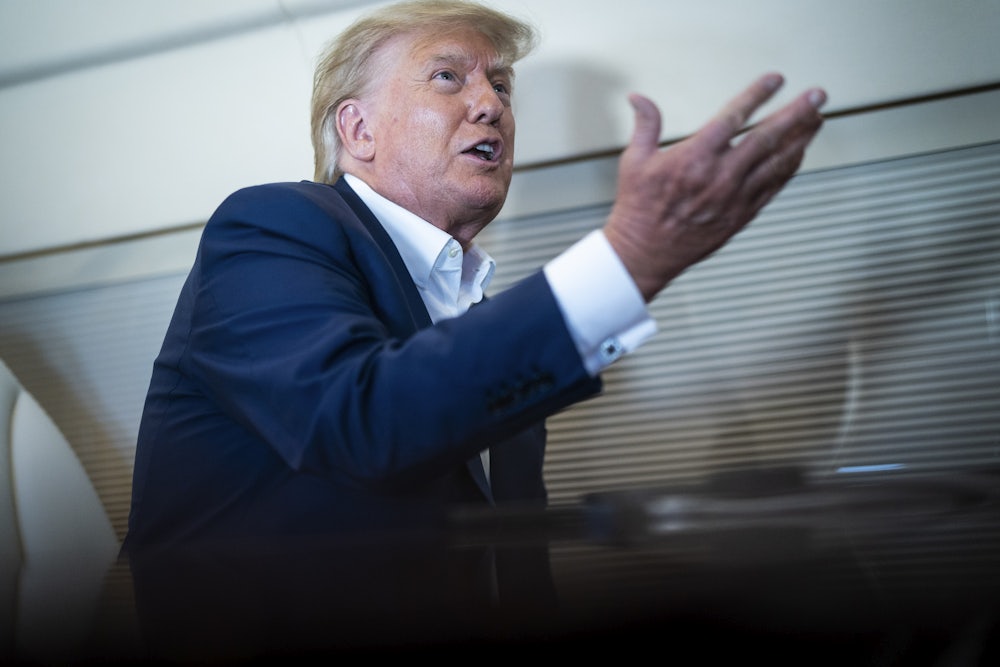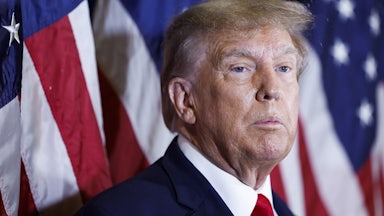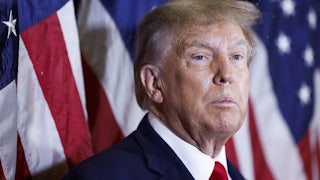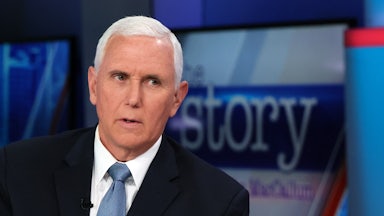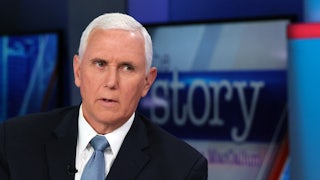There is something anticlimactic, even a little disappointing, about the decision of a New York grand jury to reportedly indict Donald Trump on charges relating to hush money paid to adult film actress Stormy Daniels during the 2016 election. There will likely be no handcuffs, certainly no no-knock raid at dawn—there will be little drama at all. The wild protests that the former president called for have come and gone. Trump injected some tension by leaking news of his own imminent arrest a week and a half ago. Since then the story has become, in the words of one former president, low energy. Donald Trump could become the first ex-president to ever be arrested and there’s a palpable sense that the ensuing drama will be, by his lofty standards at least, far from the heights of theatricality.
This was, perhaps, to be expected. Trump’s postpresidency has manufactured little beyond a general sense of exhaustion. The white-knuckled chaos of his first presidential campaign and tenure in office has given way to weariness. Trump lost his most notable superpower—his ability to dictate the news cycle at will—when he lost his Twitter account; even if he returns to the platform, it doesn’t seem likely that he will regain his ability to shape events with a few blurted sentences, as he once did. He is the clear front-runner in the 2024 Republican primary, but he is no longer as central to American political life.
Trump has given the “impending indictment” story his best shot, acting like this is his most desperate hour. But even here, he lacks the capacity to surprise us. We have known the broad contours of the crime the grand jury has focused on for years: In 2016, he authorized hush-money payments to a porn star with whom he’d had an affair a decade earlier. These payments may have had been historically transformational: It is certainly possible that he might have lost the 2016 election had the affair been disclosed at some point along the way. But it’s equally likely that it wouldn’t have altered the outcome: The Access Hollywood tape didn’t doom Trump, after all.
Stop me if you think you’ve heard this one before: Given the scope of Trump’s crimes, dinging him for campaign finance violations is not so different from cuffing Al Capone for tax evasion. One could write a biography of Trump told strictly through the lens of wrongdoing, from mere chicanery to criminality—decades of financial crimes and allegations of sexual misconduct giving way to campaign finance violations and a literal attempted coup. The most shocking thing about Trump’s arrest is that it took this long for someone to decide, “Hey, there should probably be some sort of consequences for any of the items on this vast list of misdeeds.”
Somehow, we have to lay our cynicism to the side. It’s this very long-running lack of accountability that makes Trump’s arrest so significant. For decades, Trump was the poster boy for a specific type of impunity: the wealthy playboy who flouts the law because he knows it doesn’t apply to him. For the last eight years, he has represented a different type: an authoritarian who gleefully casts norms aside, repeatedly violating the law and the Constitution to advance his own twisted political project. Most of the efforts to hold Trump accountable for his most obvious transgressions—as well as those that only came to light as a result of his political prominence—have stalled, if they’ve gotten off the ground at all.
He was impeached twice, but never convicted thanks to cowards in the Republican Party. His efforts to influence and literally overturn the 2020 election have gone unpunished, a horrific precedent. The Department of Justice, for reasons clouded in mystery, has slow-walked investigations. Other authorities with the capacity to charge him have declined to press what looked to be promising cases against the former president. Trump got away with many of his financial crimes because very rich people are rarely held accountable for such wrongdoing. He undertook a number of illegal acts with the expressed intent of overturning an election. Until now, he has never faced the music.
A great deal of the debate about Trump’s potential arrest has focused on its novelty. Donald Trump will become the first ex-president to be indicted, perhaps arrested. That arrest may happen while he is a candidate in the 2024 Republican primary. It will undoubtedly have electoral implications and be seen, in some circles, as purely political. The GOP line on his impending arrest has found Republicans arguing that even if Trump is guilty of what he is accused of—and few really exert any effort suggesting he is not—it shouldn’t matter. This is a political witch hunt, and these charges would have never been brought if the defendant to be was not Donald Trump. Republicans mount these defenses, even as they seek a new party standard-bearer to bring the Trump era that they brought upon themselves to a close.
This is a strange argument because it’s also abundantly clear that only Trump could have gotten away with everything he has: His very brazenness—his theatrical inevitability—has served as a perverse asset. It is especially strange coming from people who have spent years, decades even, arguing any number of Democrats—from the Clintons to Barack Obama to scores of party figures who will be accused of being “groomers” or agents of a deep state—of phantasmagoric scams and sins. The biggest sinner, the most elaborate scammer, is one of their own: Donald Trump committed crimes. He should be held accountable for those crimes—as should anyone else in the same position. Hopefully, this is a start.
